
The Austrian school is a heterodox school of economic thought that advocates strict adherence to methodological individualism, the concept that social phenomena result primarily from the motivations and actions of individuals along with their self interest. Austrian-school theorists hold that economic theory should be exclusively derived from basic principles of human action.

Gustave de Molinari was a Belgian political economist and French Liberal School theorist associated with French laissez-faire economists such as Frédéric Bastiat and Hippolyte Castille.

Murray Newton Rothbard was an American economist of the Austrian School, economic historian, political theorist, and activist. Rothbard was a central figure in the 20th-century American libertarian movement, particularly its right-wing strands, and was a founder and leading theoretician of anarcho-capitalism. He wrote over twenty books on political theory, history, economics, and other subjects.
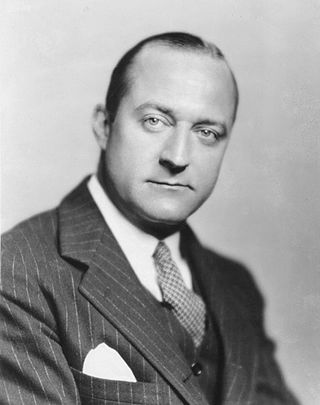
Henry Stuart Hazlitt was an American journalist, economist, and philosopher known for his advocacy of free markets and classical liberal principles. Over a career spanning more than seven decades, Hazlitt wrote extensively on business, economics, and public policy for prominent publications, including The Wall Street Journal, The Nation, The American Mercury, Newsweek, and The New York Times. He is best known for his 1946 book, Economics in One Lesson, a work grounded in the Austrian school of economics and the importance of individual liberty in economic decision-making.
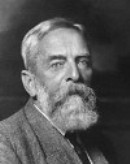
Friedrich Freiherr von Wieser was an early economist of the Austrian School of economics. Born in Vienna, the son of Privy Councillor Leopold von Wieser, a high official in the war ministry, he first trained in sociology and law. In 1872, the year he took his degree, he encountered Austrian-school founder Carl Menger's Grundsätze and switched his interest to economic theory. Wieser held posts at the universities of Vienna and Prague until succeeding Menger in Vienna in 1903, where along with his brother-in-law Eugen von Böhm-Bawerk he shaped the next generation of Austrian economists including Ludwig von Mises, Friedrich Hayek and Joseph Schumpeter in the late 1890s and early 20th century. He was the Austrian Minister of Commerce from August 30, 1917, to November 11, 1918.
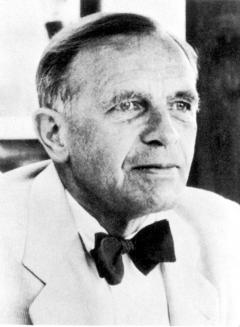
Wilhelm Röpke was a German economist and social critic, one of the spiritual fathers of the social market economy. A professor of economics, first in Jena, then in Graz, Marburg, Istanbul, and finally Geneva, Röpke theorised and collaborated to organise the post-World War II economic re-awakening of the war-wrecked German economy, deploying a program referred to as ordoliberalism, a more conservative variant of German liberalism.
Hans F. Sennholz was a German-born American Austrian School economist and prolific author who studied under Ludwig von Mises. A Luftwaffe pilot during World War II, he was shot down over North Africa on 31 August 1942, and spent the remainder of the war in a POW camp in the United States.
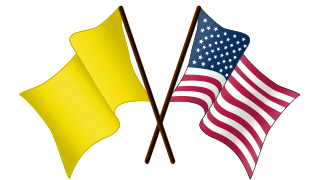
The Foundation for Economic Education (FEE) is an American conservative, libertarian economic think tank. Founded in 1946 in New York City, FEE is now headquartered in Atlanta, Georgia. It is a member of the State Policy Network.

Frank Chodorov was an American intellectual, author, and member of the Old Right, a group of classically liberal thinkers who were non-interventionist in foreign policy and opposed to both the American entry into World War II and the New Deal. He was called by Ralph Raico "the last of the Old Right greats".
Ralph Raico was an American libertarian historian of European liberalism, and a professor of history at Buffalo State College.
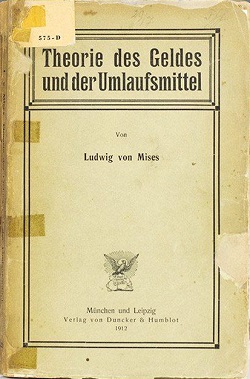
The Theory of Money and Credit is a 1912 economics book written by Ludwig von Mises, originally published in German as Theorie des Geldes und der Umlaufsmittel. In it Mises expounds on his theory of the origins of money through his regression theorem, which is based on logical argumentation. It is one of the foundational works of the Misesian branch of the Austrian School of economic thought.

The Anti-Capitalistic Mentality is a book written by Austrian School economist and libertarian thinker Ludwig von Mises. It is an investigation into the psychological roots of the anti-capitalistic stance that Mises saw as widespread in the general populations of the capitalist world. Mises suggests various reasons for this mentality, primarily his claim that free competition in the market economy allows for no excuses of one's failures.

Ludwig Heinrich Edler von Mises was an Austrian-American economist, logician, sociologist and philosopher of economics of the Austrian school. Mises wrote and lectured extensively on the societal contributions of classical liberalism and the power of consumers. He is best known for his work in praxeology, particularly for studies comparing communism and capitalism, as well as for being a defender of classical liberalism in the face of rising illiberalism and authoritarianism throughout much of Europe during the 20th century.

Frank Albert Fetter was an American economist of the Austrian School. Fetter's treatise, The Principles of Economics, contributed to an increased American interest in the Austrian School, including the theories of Eugen von Böhm-Bawerk, Friedrich von Wieser, and Ludwig von Mises.
This is the chronological list of books by the Austrian school economist and philosopher Friedrich Hayek. The dates in brackets are the original year of publication of the book.

Socialism: An Economic and Sociological Analysis is a book by Austrian School economist and classically liberal thinker Ludwig von Mises, first published in German by Gustav Fischer Verlag in Jena in 1922 under the title Die Gemeinwirtschaft: Untersuchungen über den Sozialismus.

Richard von Strigl (1891–1942) was an Austrian economist. He was considered by his colleagues one of the most brilliant Austrian economists of the interwar period. As a professor at the University of Vienna he had a decisive influence on F. A. Hayek, Fritz Machlup, Gottfried von Haberler, Oskar Morgenstern and other fourth-generation Austrian economists.
Ronald Hamowy was a Canadian academic, known primarily for his contributions to political and social academic fields. At the time of his death, he was professor emeritus of intellectual history at the University of Alberta in Edmonton, Canada. Hamowy was closely associated with the political ideology of libertarianism and his writings and scholarship place particular emphasis on individual liberty and the limits of state action in a free society. He is associated with a number of prominent American libertarian organizations.

Norman Patrick Barry was an English political philosopher best known as an exponent of classical liberalism. For much of his career he was a professor of social and political theory at the University of Buckingham.
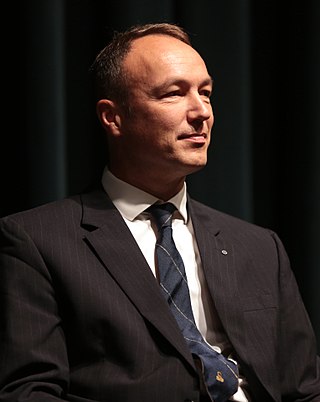
Jörg Guido Hülsmann is a German-born economist who studies issues related to money, banking, monetary policy, macroeconomics, and financial markets. Hülsmann is professor of economics at the University of Angers’ School of Law, Economics, and Management.
















